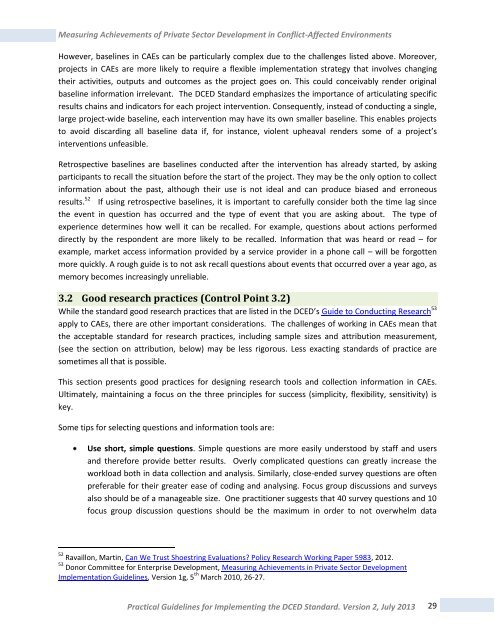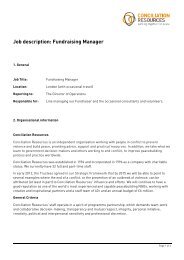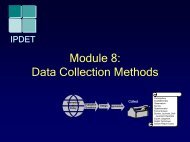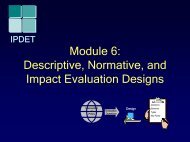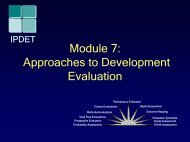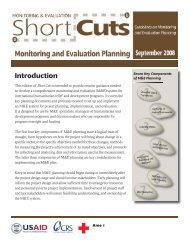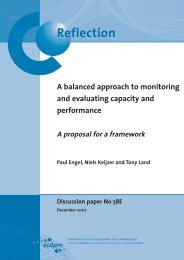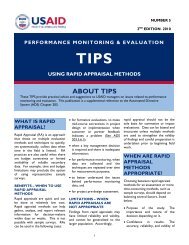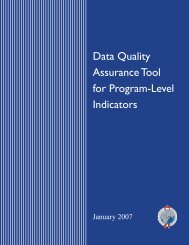Measuring Achievements of Private Sector Development in ... - DCED
Measuring Achievements of Private Sector Development in ... - DCED
Measuring Achievements of Private Sector Development in ... - DCED
Create successful ePaper yourself
Turn your PDF publications into a flip-book with our unique Google optimized e-Paper software.
<strong>Measur<strong>in</strong>g</strong> <strong>Achievements</strong> <strong>of</strong> <strong>Private</strong> <strong>Sector</strong> <strong>Development</strong> <strong>in</strong> Conflict-Affected Environments<br />
However, basel<strong>in</strong>es <strong>in</strong> CAEs can be particularly complex due to the challenges listed above. Moreover,<br />
projects <strong>in</strong> CAEs are more likely to require a flexible implementation strategy that <strong>in</strong>volves chang<strong>in</strong>g<br />
their activities, outputs and outcomes as the project goes on. This could conceivably render orig<strong>in</strong>al<br />
basel<strong>in</strong>e <strong>in</strong>formation irrelevant. The <strong>DCED</strong> Standard emphasizes the importance <strong>of</strong> articulat<strong>in</strong>g specific<br />
results cha<strong>in</strong>s and <strong>in</strong>dicators for each project <strong>in</strong>tervention. Consequently, <strong>in</strong>stead <strong>of</strong> conduct<strong>in</strong>g a s<strong>in</strong>gle,<br />
large project-wide basel<strong>in</strong>e, each <strong>in</strong>tervention may have its own smaller basel<strong>in</strong>e. This enables projects<br />
to avoid discard<strong>in</strong>g all basel<strong>in</strong>e data if, for <strong>in</strong>stance, violent upheaval renders some <strong>of</strong> a project’s<br />
<strong>in</strong>terventions unfeasible.<br />
Retrospective basel<strong>in</strong>es are basel<strong>in</strong>es conducted after the <strong>in</strong>tervention has already started, by ask<strong>in</strong>g<br />
participants to recall the situation before the start <strong>of</strong> the project. They may be the only option to collect<br />
<strong>in</strong>formation about the past, although their use is not ideal and can produce biased and erroneous<br />
results. 52 If us<strong>in</strong>g retrospective basel<strong>in</strong>es, it is important to carefully consider both the time lag s<strong>in</strong>ce<br />
the event <strong>in</strong> question has occurred and the type <strong>of</strong> event that you are ask<strong>in</strong>g about. The type <strong>of</strong><br />
experience determ<strong>in</strong>es how well it can be recalled. For example, questions about actions performed<br />
directly by the respondent are more likely to be recalled. Information that was heard or read – for<br />
example, market access <strong>in</strong>formation provided by a service provider <strong>in</strong> a phone call – will be forgotten<br />
more quickly. A rough guide is to not ask recall questions about events that occurred over a year ago, as<br />
memory becomes <strong>in</strong>creas<strong>in</strong>gly unreliable.<br />
3.2 Good research practices (Control Po<strong>in</strong>t 3.2)<br />
While the standard good research practices that are listed <strong>in</strong> the <strong>DCED</strong>’s Guide to Conduct<strong>in</strong>g Research 53<br />
apply to CAEs, there are other important considerations. The challenges <strong>of</strong> work<strong>in</strong>g <strong>in</strong> CAEs mean that<br />
the acceptable standard for research practices, <strong>in</strong>clud<strong>in</strong>g sample sizes and attribution measurement,<br />
(see the section on attribution, below) may be less rigorous. Less exact<strong>in</strong>g standards <strong>of</strong> practice are<br />
sometimes all that is possible.<br />
This section presents good practices for design<strong>in</strong>g research tools and collection <strong>in</strong>formation <strong>in</strong> CAEs.<br />
Ultimately, ma<strong>in</strong>ta<strong>in</strong><strong>in</strong>g a focus on the three pr<strong>in</strong>ciples for success (simplicity, flexibility, sensitivity) is<br />
key.<br />
Some tips for select<strong>in</strong>g questions and <strong>in</strong>formation tools are:<br />
Use short, simple questions. Simple questions are more easily understood by staff and users<br />
and therefore provide better results. Overly complicated questions can greatly <strong>in</strong>crease the<br />
workload both <strong>in</strong> data collection and analysis. Similarly, close-ended survey questions are <strong>of</strong>ten<br />
preferable for their greater ease <strong>of</strong> cod<strong>in</strong>g and analys<strong>in</strong>g. Focus group discussions and surveys<br />
also should be <strong>of</strong> a manageable size. One practitioner suggests that 40 survey questions and 10<br />
focus group discussion questions should be the maximum <strong>in</strong> order to not overwhelm data<br />
52 Ravaillon, Mart<strong>in</strong>, Can We Trust Shoestr<strong>in</strong>g Evaluations Policy Research Work<strong>in</strong>g Paper 5983, 2012.<br />
53 Donor Committee for Enterprise <strong>Development</strong>, <strong>Measur<strong>in</strong>g</strong> <strong>Achievements</strong> <strong>in</strong> <strong>Private</strong> <strong>Sector</strong> <strong>Development</strong><br />
Implementation Guidel<strong>in</strong>es, Version 1g, 5 th March 2010, 26-27.<br />
Practical Guidel<strong>in</strong>es for Implement<strong>in</strong>g the <strong>DCED</strong> Standard. Version 2, July 2013<br />
29


